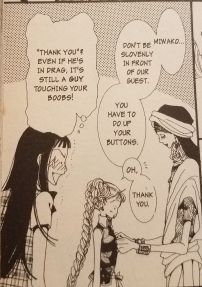Something didn’t occur to me until just now as we dive further into Paradise Kiss: we’ve never seen Yukari’s “ordinary day”. Most stories, particularly those that follow a monomyth structure, usually have this “ordinary day” at the beginning, where we can see what the main character’s life is like before the adventure starts. This gives us a frame of reference for how the character’s life is about to be turned upside down, be it by hatching a dragon or meeting someone new. But we haven’t gotten your typical “ordinary world” with Paradise Kiss. There’s maybe two pages in the beginning of the book that focus on Yukari’s thoughts before she gets spotted by Arashi and Isabella, and taken to their studio.
And yet, without a typical ordinary day sequence, we get a good sense of what her life is like. School, then cram school, all the while wondering what she wants out of her future. I think the strangeness of going to the studio and meeting George and his crew would have been better emphasized by showing this ordinary day, particularly for non-Japanese audiences, but it’s not necessary.
I only noticed this because chapter four is the first time we actually see Yukari at school, but we know from her narration that school is one of the biggest stressors in her life. We also – finally – meet Hiro Tokumori. Tokumori is one of Yukari’s classmates, and she has a big crush on him. In the first chapter, Yukari accidentally leaves her student passbook in the studio, where she happens to have a picture of Tokumori. She is
mortified at the thought that George might have seen the picture.
However, the day at school doesn’t last long, and we don’t see much of Tokumori. What I like about the Paradise Kiss studio crew is that, even if they haven’t had much screen time yet, I can already see some of their inner worlds, Miwako’s in particular. But not so with Tokumori. I’ve read the entire Paradise Kiss series before this, and honestly…I can’t remember a thing about his personality.
At this point, Tokumori’s presence and the photo is really only there to show Yukari’s budding attraction to George, though she won’t admit it yet, and probably doesn’t know it herself. It turns out George never saw the photo of Tokumori, and Yukari’s incredibly relieved. Here we see the beginnings of a conflict that has nothing to do with the fashion show. Yukari has a big crush, and she doesn’t want George to know about it. As I mentioned in my last entry, a good romance should have some realism to it, and this is exactly it.
After school, Yukari goes back to the studio, though she hasn’t decided yet whether she wants to model or not. She receives  a shock after interrupting Arashi and Miwako making out on a pool table in the studio. Even though Yukari has stopped looking down on the art school kids by now, there’s still a gulf between her and them. It’s not that she’s shocked at the making out, that would surprise most people. But rather, Isabella, who is transgender, helping Miwako button up her shirt after.
a shock after interrupting Arashi and Miwako making out on a pool table in the studio. Even though Yukari has stopped looking down on the art school kids by now, there’s still a gulf between her and them. It’s not that she’s shocked at the making out, that would surprise most people. But rather, Isabella, who is transgender, helping Miwako button up her shirt after.
While Miwako and Arashi are both pretty comfortable with Isabelle, Yukari can’t help thinking of her as a man, and it’s one of those things that gets brought up a couple times in this volume. To her (and Yazawa’s) credit, Yukari doesn’t say anything hateful to Isabella about her being transgender. Right now it’s just something she’s geeked out about, but as the series progresses, that strange feeling Yukari has towards Isabella fades away, and soon Isabella’s gender identity isn’t an issue for her.
Embarrassed about the situation, Yukari offers to go out and get tea for everyone, and Miwako tags along. While they’re alone, Miwako asks Yukari about the photo of Tokumori in her student passbook, incorrectly assuming that Tokumori is Yukari’s boyfriend. As it turns out, Miwako, Arashi, and Tokumori used to live together in the same apartment. When I first read this, I assumed that they meant the same actual apartment, but now I realize that they could mean just the apartment building. It’s not entirely clear.
I only recently learned that before Paradise Kiss, Yazawa published another manga, Gokinjo Monogatari, which follows Miwako’s older sister, Mikako. Gokinjo Monogatari may answer some of the questions I have about Miwako’s and Arashi’s past, but I’ve yet to read it.
As far as the childhood friends turned lovers trope, I don’t hate it, but it’s not my favorite, either. I just don’t see it as all that realistic, depending on the age of the characters. I can buy high school sweethearts who fell in love, parted ways, and came back together. But I don’t think falling in love with your childhood friend that you’ve spent most of your life with is that realistic. Part of this is the Westermarck effect, which hypothesizes that children who live closely together during their early years will not find each other attractive as they grow older, seeing each other more as brothers and sisters than potential mates. Like most social theories, it can’t be proven or disproved, so I would like to offer up one of my own:
You just get sick of each other.
When you spend almost all of your days with one person, there are times when you’re going to get tired of each other. You’ll get irritated and fight, and need to take a break, be it for a few hours or a few days. It doesn’t mean that you don’t care about each other, it just means you need a break. This happens with friends, siblings, lovers, just about anyone who lives in constant close contact with another person. Often, the root cause of many of the fights I had with my sister were just because we’d spent too much time together.
This is actually addressed in the manga, when Arashi and Miwako are going through a rough patch. Miwako is concerned about Arashi’s silence, and he just tells her that when you’ve talked to someone else almost every day of your life, at some point you’re going to run out of things to say. The usual cutesyness of the childhood friends trope gets undercut by the problems in their relationship, one of which is the love triangle between Miwako, Arashi, and their childhood friend, Tokumori.
Most of the chapter is dedicated to Yukari getting to know Miwako better, and her shared past with Tokumori. Miwako is quickly becoming my favorite character in the book. While referring to herself in third person drives me crazy, she’s adorable and chipper, like a ray of technicolor sunshine. Between Arashi’s brash attitude and Yukari’s cynicism, Miwako brings some joy into an otherwise dramatic series.
